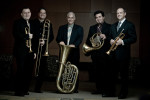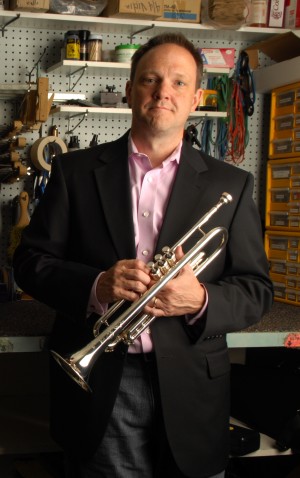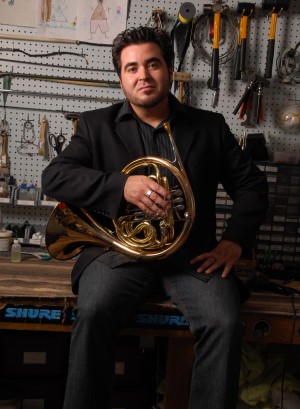Mixing the traditions and styles of different generations, languages and musical backgrounds, the new Boston Brass has emerged a very different group than its predecessor. While the earlier edition of BB drew some influences from the dramatic and musical elements of a drum corps style and featured the notable frequent use of a euphonium in a brass quintet, the new group has taken a fresh approach. With the addition of Sam Pilafian, founding tubist of the Empire Brass, and trombonist Domingo Pagliuca, the group has embraced a more improvised style of music drawing on a mix of authentic world music influences and classical standards. Their dynamic range is compelling, and their fluidity admirable. They are poised and polished and with the combined experiences of Pilafian and Dallas Brass alum Chris Castellanos-the are ready to make an even more profound mark on the chamber music world. davidbrubeck.com is honored to host Boston Brass as the fourth installment of our chamber music inspired interview series-“FIVE!”
Sam Pilafian, tuba
1. How do you approach playing in a touring brass quintet differently with Boston Brass as opposed to when you toured with Empire?
(hahaha)…This is very much a Rip Van Winkle story!!
(“Back in the Pre-Digital Day” with Empire we will call THEN…
I will refer to today’s Boston Brass as NOW :)) :
-THEN:We carried an extra suitcase with “safety music”.
-NOW: we all carry everyone’s parts and scores on laptops, iPads and even smart phones.
-THEN: I went to find a pay phone or a fax machine every time we stopped moving (on a plane or automobile), to check in with the manager, sponsor of the impending concert, family, etc.
-NOW: communication is in my pocket at all times…(Only Dick Tracy and Flash Gordon had this in Empire days!!)… I can fax, email, talk, text, send documents, photos, graphics, etc. from my phone or another digital device!
-THEN: Travel outside the US presented a myriad of communication and financial problems: expensive telephone calls and often daily currency changes-prior to the Euro. Using a credit card was dangerously insecure and subject to up charges by vendors who were waiting for currency rates to go in their favor before processing your transaction.
-NOW: Internet communication allows all of the above-listed activities to be done for free with a Wi-Fi or hard-wired signal. Financial issues are now guaranteed safe with stable rates by using major credit cards!
-THEN: Arranging, a major responsibility of mine in Empire, was also pre-digital. I learned to write and copy parts on a clipboard “floating” on my left forearm and hand while riding in planes, cars, ferries, etc. We often had part copying pizza parties in my room while on tour! (One time we got on a flight from Zurich to NYC with the count Basie Band and we all copied 2 new Frank Foster arrangements and visited…(I miss the social aspect of music copying but hated how slow the process was:)) Whole concerts and recording projects were arranged on the move in this manner for over 20 years!
-NOW: Boston Brass has THREE arranger/ composers
(José, Chris and me). Digital technology in the writing area is one of the great improvements between then and now!!! The speed, instant playback, orchestrated sounds and legibility have changed our lives for ever! I love traveling with my writing colleagues! It’s like an arts colony around Boston Brass these days!!!
-THEN: LP/Cassette/CD recordings and radio production recordings(common outside the US),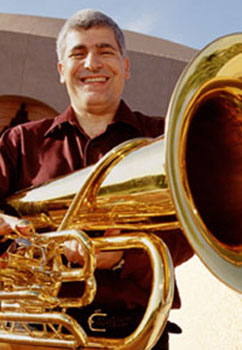 were recorded and finished (or edited and mastered) by flying to the city where the recording company headquarters was located. I often made several ” post recording” trips to represent The Empire Brass during editing or mastering.
were recorded and finished (or edited and mastered) by flying to the city where the recording company headquarters was located. I often made several ” post recording” trips to represent The Empire Brass during editing or mastering.
-NOW: Live concert videos and audio are easily made on tour …either self-made or in collaboration with the concert presenter. “Home” equipment is so good that the group may have more hits from YouTube or other Internet services than we ever got from the very well-selling studio Empire recordings. “Post recording”, for studio recording sessions, is done anywhere from cloud based data sent to our digital Internet devices. One only needs professional quality headphones to make critical decisions anywhere! Another strong difference in the present experience is that both José and Domingo are also professional recording engineers. I am a professional audio recording producer and video line producer. We have people from the media business in the group!!!
-THEN: I did the business work of Empire as well (contracts, travel scheduling with an agency, payroll, taxes, etc)…
It was much better to do this when arriving home from tour while surrounded by “business machines” like fax,copy machine, type writer, postal meter,etc. This would routinely take more than a whole day upon returning home.
-NOW: Just about 100% of the business is done digitally (very little mail or express services). All the business devices are available on any Internet device that we are carrying, including the smartphones in our pockets. I am amazed how fluidly Jeff Conner runs most of our business, and Domingo leads the social media/ PR/ advertising campaign….while on the move. My, My…how times have changed!!!
FINALLY, the biggest difference between the Empire and Boston experience is the amazing diversity of the present Boston Brass. They are well-equipped to authentically present improvised jazz and world musics (from throughout their personal experiences and histories) while at the at the same time present concerts at which they are playing wonderfully in the classical tradition. This depth of the diversity in addition to the fact that we are a truly multi-generational ensemble with over a 30-year spread in ages makes our rehearsals, performances and recording sessions very special. I feel like I trained for this diverse moment my whole life. (Kudos to Chris Castellanos, who did the same on horn, making him Extremely rare and valuable to the present efforts of Boston Brass:))
I am so fortunate to have another world class experience in the same career area! Again!!!
2. How do you view the role of a tuba in a brass quintet, and which size tuba do you prefer? How could a bass trombone or euphonium fill that role?
For me, it’s the fact that this kind of music making allows me to be constantly in the nucleus of the activity….I’m in the rhythm section much of the time, creating tempo, feel, impacting dynamic shapes, accompanying and having wonderful solo moments…. But,it’s the constant impactful involvement that makes this so special for “bottom feeders”!
One big difference between the Empire and Boston Brass experiences is the instrument used to participate with these groups. Empire was an orchestral sound approach with the Chicago Symphony Brass quintet recordings as a model. The great recordings by the Borodin String Quartet(USSR), led by Dubinsky and featuring very authoritative cello playing, were also very influential in making sound decisions regarding Empire. I spent my career in Empire playing a rather small rotary valve CC tuba.
From the very beginning of my experience with Boston Brass
I have used a piston valve F tuba. Before joining the group, I was writing and producing for them. I had always wondered what this wonderfully diverse concept of sounds that they have would sound like with a bass instead of contrabass tuba. The only stipulation was that the horn would have to be able to “be the bass player”. Mouthpiece choices have led me find the sound that is as flexible as I need for such a group as Boston Brass.
As to the last part of this question, about bass trombone or euphonium, the answer is YES!! Being the bottom of any group is a state of mind which I call “Foundation Function”. You listen to and study great bottom players or singers “doing their job” in all kinds of music. You study the sound pressure and attack of these great “bottom feeders”… How they create atmosphere and feel from the bottom…indeed, how they “lead” from the bottom! Well that state of mind can work just as good or better on bass trombone or euphonium! It’s the mindset that creates musical and physical changes in these instrumentalists :)) Good “bottom playing”can happen from any instrument. If you hear it that way, you will find a way to do it! I am reminded of Mark Gould, who spent 29 years playing principal trumpet parts at the Metropolitan Opera, but was incredible at the bottom of any recording session trumpet section!! Also, in my mind’s ear is an arrangement we did in Empire of the Vaughn Williams
Tuba Concerto. Martin Hackleman played the bass lines for most of that selection with amazing authenticity!
3. What new things do you hope that the Boston Brass will achieve while you are a member?
By reading above, one can only imagine the possibilities when a group is enthusiastically Growing in all these directions from a wide spread of life experiences and expertise. I started to try trending this situation and Gave Up !! It quickly became evident that staying in the Present and working on growth in all these directions is the best pathway. Assessing where we are heading every 60 days or so seems to get the compass adjusted properly for what has been continuous growth so far.
What Fun!!
1. Your tone production is remarkable. How important is matching the beginnings of notes?
Thank you for your kind words. In order to have true meltdown of sound we have to start with the same concept of articulation. As second trumpet, it’s my responsibility to match Jose’s style and concept of articulation.
2. How do you focus on the beginning part of the notes in exercises and rehearsals? It is important having everyone on the same page concept wise of articulations. We will also have someone go out and listen in front of the band to listen and make sure everything is lined up.
3. How has having Sam Pilafian in the group changed Boston Brass?
Having Sam in the band is incredible! Sam is one of the greatest chamber musicians and master teachers if our time. He’s getting us to stretch our imaginations and mesh musical concepts with our sounds and interpretations of tunes. Everyone is able to dial into his sound, creating an amazing Boston Brass signature sound.
1. Your sound is very present and ringing. Please describe your concept of an ideal horn tone within the setting of a brass quintet and specifically the Boston Brass.
First, thanks for the compliment! I’ve been playing with quintets full time for 11 years now and have come to realize a few things about the concept of horn sound in the quintet setting. Many people think we are at a disadvantage, that being the bell faced the wrong way and all. This does not have to be the case. I choose to turn it into an advantage by standing on the end of the quintet with my bell semi-facing toward the audience. It allows for clear distinct articulation and better projection. If I want a more soft lyrical sound for a particular song or passage, I turn my bell in or away from the audience. If I we are playing jazz and I want more direct sound, I angle out towards the audience-essentially becoming a bell front instrument. Playing in a chamber group is teamwork and you should always be aware of the role you are playing at the moment. Choosing one particular set up and sound and using it all the time is, in my opinion, a mistake.
2. You really have a masterful command of commercial playing. How hard was this to come by as a horn player? What paths would you recommend to young horn players?
I grew up in Las Vegas and a lot of my early professional playing was in showrooms. Playing in big bands or production shows requires a different mindset than an orchestral setting, of course, but not only that; it requires a skill set that horn players are not commonly familiar with. You need to know how to interpret articulation, how to play with style, who to listen to and how to read. You only learn these things by doing them and listening to people who do them well. I would tell any young musician to step outside of the box, play by ear and listen to everything they can get their hands on without bias. As a musician you want to be able to step into any situation and be comfortable, not just the “I am a classical player†mentality.
3. Dallas Brass and Boston Brass are both excellent groups. You have played in both. How would you characterize the different approaches.
They are two top-notch groups and it has been a privilege to play with both. There are several gleaming differences I can think of. The main difference between the two groups is ownership. Dallas Brass is owned by the founder, Michael Levine. Everyone else in the group are employees of the Dallas Brass. They can give input on programming, business issues, choreography, scheduling, marketing and so forth but the final say is with the owner.
In the Boston Brass, we all own 20 percent of the group. Everyone has a role in the group and we vote on the final say in everything. With the BB, we are constantly tweaking the show and all bringing much more to the table than just simply showing up and playing to the best of our ability. When the group succeeds, that success goes straight to the 5 guys making it happen. The motivation to do everything possible to make the show better is built into the fact that you are an owner and want the product to be amazing! The Boston Brass is a passion and collaboration of all 5 members.
Jose Sibaja, trumpet
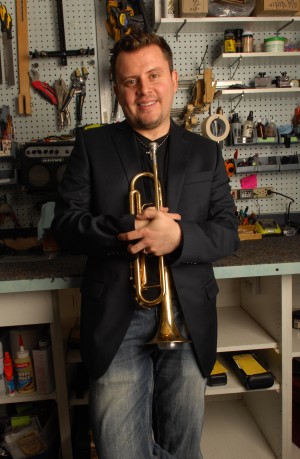 1. You wear a lot of hats in the group. Please describe your approach to jazz improvisation in three different tunes with different styles.
1. You wear a lot of hats in the group. Please describe your approach to jazz improvisation in three different tunes with different styles.
Jazz improvisation for me is no different than any other style of music. The vocabulary, feel and style is what changes from tune to tune. Your ideas and the development of these ideas are a part of your musical experiences. Listening to music and singing are the principal tools to improvising, then all the technical aspects follow. It’s like any other musical style, the bigger your ears are the better your solos will be, therefore; working on ear training is a must.
2. How do you approach ‘lead trumpet’ type playing in a brass quintet, as opposed to a big band or salsa group?
Lead playing in a brass quintet (when playing commercial music), is very similar to that in a big band or a salsa band. The level of awareness and the commitment to rhythm is a bit more intense in a quintet since the sole role of groove falls within the players, without the help of a drummer or a rhythm section per say. Also, the dynamics are more extreme; especially when playing softer. Chamber music applied to all fields and styles of music makes a better experience for the performer as well as for the listener.
3. What is your favorite performance mute, and why?
I really enjoy all mutes depending on the style. I would probably have to go with plunger and cup mutes.
Domingo Pagliuca, trombone
1. Your predecessor in BB played a good deal of euphonium. What challenges has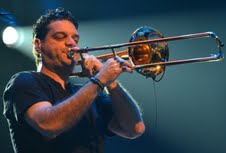 playing euphonium parts on trombone presented?
playing euphonium parts on trombone presented?
The first challenge that was presented was the technical one. I needed to be able to play what was written in the arrangement. There are very difficult passages that involve a great deal on technical development. Fast notes that needed to sound like a horn in some points and like a trumpet in others. Another challenge is to be able to play as legato as the euphonium. I needed to sound like I have valves instead of a slide and that is when the challenge comes. To be able to play different kinds of legatos. Articulation is another challenge.
2. How did you solve those challenges? Any special techniques, concepts or exercises?
First of all I started to play the passages very slowly and at the same time I used different articulations to be able to hear if the notes were coming out clear and even. I needed to make sure that they all sounded equally played. I normally would play any exercise in glissando. I do that to make sure that my air is even, steady and has direction.
It is a great challenge to any brass player to be able to play any passage with a different articulation and have that same passage to sound equally beautiful within the style that the music may require. Scales are a great help to maintain a good air stream and as well as articulation and slide technique. The Rochut (Bordogni) etudes are another tool that is always helpful to check the different aspects in playing that a trombone player needs to have at all times.
3. Describe how you blend with each of these instruments?
Tuba: In my opinion, to be able to blend with the other instruments of the quintet or any other particular ensemble, you need to really open your ears and be able to hear what the others are doing and figure out how you can fit into their sound. With Boston Brass it is amazing how “not so difficult” it can be. Here, you have 4 excellent musicians where each one knows what to do and are masters of their instrument. There are moments that I need to sound like a tenor trombone. Others, like a bass trombone and in many cases, like a second horn or a 3rd trumpet. One really needs to listen and make the best effort to sound and blend within the group.
Horn: To be able to blend with the horn, I have to change the color of my sound. In many cases become a 2nd horn and I need to play as a horn. That means that I even have to articulate like a horn player.
Trumpet: to blend with the trumpet I have to even change the speed of the air. My sound needs to be full and I might even say brighter. Match their articulation and get into their sound.
Every piece is a challenge since, as a trombone player, I need to be versatile enough to change the way I play and sound. In some instances, I have to play with different articulations and sound, and in others I have to change the style as well as the character.
c. 2014 David William Brubeck All Rights Reserved davidbrubeck.com
Interested in more “FIVE” tm interviews?
Canadian Brass 2014, Windsync 2014, Boston Brass 2015, Mnozil Brass 2015, Spanish Brass 2014, Dallas Brass 2014, Seraph 2014, Atlantic Brass Quintet 2015, Mirari Brass 2015, Axiom Brass 2015, Scott Hartmann of the Empire Brass 2015, Jeffrey Curnow of the Empire Brass 2015, Ron Barron and Ken Amis of the Empire Brass, Meridian Arts Ensemble 2015, Berlin Philharmonic Woodwind Quintet 2015, American Brass Quintet 2015
Images courtesy of BOSTON BRASS
Boston Brass Interview, Boston brass quintet interview, brass quintet interview

